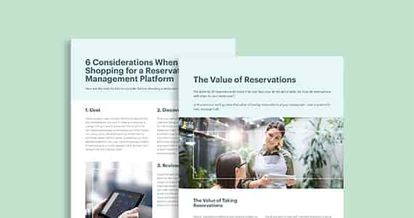You’ll likely have an idea whether you’ll be buying or leasing a restaurant space well before you start looking at locations. Your financing will determine what you can afford, and whether you can lease or buy a building.
In this article we’ll guide you through the pros and cons of buying a space if you’re considering that route. We’ll also walk you through the steps to leasing a restaurant space (because odds are – you’ll be leasing).
You’ll walk away from this piece knowing:
- What should be included in a lease agreement
- Questions to ask a landlord about your lease
- How to negotiate your lease agreement
- The credit you need for a lease agreement
- How to navigate a lease agreement renewal
It’s time to play hard ball!
Advantages and Disadvantages of Buying a Restaurant Space
The choice to lease or buy commercial property is one that, when available, is pretty lucky to encounter. As 95% of commercial spaces are available for lease, you likely won’t come across a location that is for sale.
If you’re considering putting in the time to find a space to buy, there are some things to consider. Here are a few advantages and disadvantages to buying your restaurant space.
Advantages
- You’ll be investing in your own space, paying your own mortgage instead of someone else’s. Oftentimes mortgage payments are comparable to monthly rent. A mortgage also has the possibility of being paid off.
- Property values tend to increase over time. The appreciation in value may result in a nice payoff if you sell your business, and the profit here doesn’t even include the increase in value of your business itself.
- You won’t need to deal with landlords or property managers.
Disadvantages
- You may need to compromise on location; most popular, high traffic commercial properties are not for sale.
- As the owner of the property, you’ll be responsible for maintenance and repairs. These costs can add up over time and put a strain on your business if you’re not doing well.
- You need a lot more startup capital to buy a space. The average restaurant owner can’t raise enough money to buy a property outright, considering how expensive it can be to start a restaurant in the first place.
Remember: Always work with professionals when leasing or buying a restaurant location. For any purchase of space, you’ll want to work with a real estate agent, lawyer, and, if possible, a restaurant consultant. Find out who to work with here.
What Is a Lease Agreement?
A commercial lease agreement is a legally binding rental agreement between a landlord and a tenant. You should consult a lawyer to understand the relationship between the tenant (you) and the landlord.
While all commercial leases are unique to accommodate the relationship between the tenant and landlord, there are some points that should be clearly identified in your agreement. Here’s what to include as a starting point:
- Description and size of premises
- Base rent, operating costs, taxes, utility payments, payment delivery method
- Method for handling past due payments
- Security deposit
- Renewal terms
- How the property will be used
- Parking spaces available
- Sign policy
- Subletting terms
- Party responsible for paying utility services
- Party responsible for partial and substantial damages due to disaster
- Conditions under which the landlord can enter to repair, inspect, or examine the property
- Termination agreement (early termination and breach due to default, bankruptcy, etc.)
- Laws govern the relationship, including the jurisdiction that handles disputes
- Method through which future conflict should be handled (mediated, arbitrated, or litigated in court)
- For lease agreements in the United States: clarity on how the tenant and landlord will handle instances of “eminent domain”, which is when the federal government takes possession of private property for public use
Here are some sample commercial lease agreements:
United States
Ontario, Canada
Agreement to Lease: Commercial – Long Form
5 Questions to Ask before Leasing a Restaurant Space
With so much to consider when leasing a restaurant space, it can be difficult to think critically and operate with clarity during a negotiation agreement. While every situation is unique, requiring different questions, these five questions will help you prioritize what’s most important in a lease agreement.
- What are the renewal options?
Yes, it might seem scary to commit to a space for the long term as a startup business – but the repercussions of being unable to renew your lease could leave you in a much worse position. The cost of business disruption and moving expenses should inspire a thorough review of your renewal options when entering into a lease agreement at the very beginning.
- What are the renovation and property improvement restrictions?
Every lease agreement will stipulate some restrictions on renovation, which will impact how you can make modifications to the property. You’ll need to know about these limitations and restrictions early on.
For example, do you need to return the space to its original condition when you leave? You’ll also likely be purchasing or leasing fixtures, appliances, and equipment, so you need to know if they will remain your property or become the property of the landlord after you vacate.
- What are the parking options?
You’ll need enough parking spaces for patrons (see How to Evaluate a Potential Restaurant Space), and you should ask the landlord about parking options in your area. You should also find out whether there are enough guaranteed parking spots for all tenants and staff in the building.
- What are your signage rights?
Know your rights when it comes to signage. You’ll need to know where you can display external signage, and whether there are any limitations on renovations.
Your external facade signage will need to comply with municipal codes, ordinances, and all regulations in your lease agreement. Review zoning codes and ordinances to determine whether they line up with what’s in your lease agreement. You may have some room to modify language.
While each lease agreement will have different regulations for external signage, it will likely be your responsibility to pay for your signs’ installation, maintenance, and replacement. You’ll need to provide size, design, materials, and location of the sign to your landlord, and receive their written consent before you can start the installation. As long as the size complies with municipal codes and ordinances, the landlord should provide reasonable notice of approval.
Other forms of external signage to evaluate and negotiate include:
- monument signage
- pylon signage
- sandwich board signage and banners
- temporary pull-away signage
Understand where you can display internal signage as well. As with most lease agreements, you may have to receive written consent from the landlord to make modifications, and will be responsible for installation, maintenance, and replacement.
- What are the landlord’s responsibilities?
As a tenant you need to know who is responsible for what to prevent unforeseen future expenses. Ask about:
- Cleaning
- Repairs
- Upkeep of property and washrooms, parking lots, entrances, and outdoor spaces
- Grass cutting
- Snow removal
- Cost of operating expenses such as property taxes, insurance, utilities, security and repairs to equipment (e.g., HVAC)
Once you’ve established the basic tenets of the lease agreement, then comes the fun part: negotiating a mutually agreeable contract with the landlord.
5 Tips for Negotiating a Commercial Lease with a Landlord
Once you’ve entered into negotiations for your lease agreement, you’ll need to know what to look out for to ensure a favorable contract for both you and the landlord. Arriving at a happy place of compromise is crucial to starting your relationship with your landlord on the right foot.
When negotiating a commercial lease agreement, you’ll want to keep three things in mind:
- If you aren’t an expert, hire one. You should fully understand the legally binding agreement you are entering, and you don’t want to rely on the landlord to explain it to you.
- The lease may be based on the landlord’s needs, so you should know your rights as a tenant so you can advocate for them in your negotiations.
- Everything is negotiable. Do not be intimidated by legalese and clauses. You have the right to negotiate the removal and addition of conditions to serve you better.
Here are tips for negotiating a favorable lease agreement with your landlord.
- Evaluate and negotiate the length of the lease agreement.
We can’t stress enough how important is it to negotiate the length of your lease.
While professionals often recommend startup businesses to commit to a short-term lease of 1-2 years, restaurants are bound by their locations and should consider longer term leases. Commercial landlords tend to follow either a 1-2 year or 3-5 year lease agreement, and in hot markets they will likely not waver from their agreements. You may, however, be able to negotiate an option to renew that will allow you the opportunity to continue to extend your length of time in your space.
As a restaurant owner, try to negotiate a longer lease and an option to renew whenever possible.
- Know the average commercial rent in your neighborhood.
Do the research and identify the rent of comparable properties in your neighborhood, so you know you’re entering into a fair agreement. Consider factors such as street traffic, parking, and other perks such as renovation rights.
With information on comparable market rents, you’ll have leverage to negotiate a fair price. If you have a commercial real estate agent representing you, they will negotiate this for you (saving you money and time).
Try to minimize or cap your annual rent increase in addition to negotiating your security deposit, and alter the conditions that need to be met to ensure it’s returned.
note: how much does it cost to open a restaurant: start up costs 101 lists acceptable monthly rent and utility expenses as 5%–10% of your forecasted sales.
- Negotiate away from potential operating costs.
Determine whether your lease is a “gross lease” (i.e., all costs included) or “net lease” (i.e., operating costs on top of your rent). Many commercial leases stipulate that tenants are responsible for the cost of repairing and maintaining common areas.
If your landlord wants you to assume responsibility for these costs, try to negotiate a slightly higher monthly rate as a way to encourage your landlord to become responsible for these costs.
Based on your evaluation when you reviewed the space, you should have a cost estimate of required renovations, which will also help negotiate your lease agreement. After all, if you’re improving the space, you should receive some benefit in return.
- Review all clauses and add favourable ones.
Clauses are simply an additional stipulation in the contract and another area where you can negotiate.
All commercial lease agreements will have subsections with their own specific clauses and agreements. You have the ability to review and modify in these sections. Just because a clause is there it doesn’t mean it needs to stay, and you can add other clauses as you need them.
Clauses to review:
- Rent clause: pay attention to automatic rent increases, tenant improvement deductions, etc.
- Description of premises clause: make sure there is detailed description of the rental space(s) and include any access issues preventing people from getting to the space
- Parties clause: make sure you have your business’ name on the lease and not your own to shield you from liability
- Term clause: the lease agreement begins the moment you sign it, so write several start dates for different obligations to prevent unnecessary insurance or rental expenses before you’ve even moved in
- Improvement and alterations clause: the ability to modify, improve, or alter the space can be complex, so expect several negotiations; also consider who is paying for renovations and how this impacts rent
Clauses to add as needed:
- Sublease/sublet clause: to protect you if you move or close and need to lease out the space
- Co-tenancy clause: allowing you to break your lease if an anchor tenant leaves (i.e., a tenant who drives business to you)
- A clause that restricts the landlord from renting to another tenant that may compete with you
- Signage clause: to ensure you have access to public visibility for your restaurant
- Option to renew clause: allowing you to renew when the lease is up
- Review the termination clause.
Make sure you read and understand the commercial property lease as it relates to default and termination of the agreement so you know your rights and how to negotiate changes.
You’ll need to make sure you negotiate a grace period in case you default on your lease and negotiate potential penalties for early termination of your lease agreement. Ask whether you can ensure you’re only obligated to pay one month’s rent upon termination rather than having to pay the entire amount left on the lease.
Knowing your tenant rights and responsibilities will set you up to succeed. Here are some resources to review when researching your legal rights as a tenant.
New York City
NYC Business Solutions Commercial Leases
Chicago
Illinois General Assembly Landlord and Tenant Act
Toronto
Ontario’s Commercial Tenancies Act: What you need to know
Credit Requirements for a Commercial Lease
Acquiring a commercial lease is a little different than a residential lease. Unlike a residential lease, there is no standard practice for credit requirements to get a commercial lease.
Depending on the landlord, you’ll have to provide different financial and business statements to prove your financial security. Some information a landlord may want to see include:
- Current credit report
- Current banking reference
- Landlord reference (if applicable)
- Current personal financial statement (must be signed)
- Income tax returns for the last two years (corporate or personal)
- Bank statements (to demonstrate available cash)
- Business plan and budget
- Paperwork proving that your business is a corporate entity, limited liability company, general or limited partnership, etc., and names and information of any partners, directors, etc.
Your landlord will be more interested in your personal credit than your corporate credit. Even if your credit score is marginal, you may be able to negotiate a lease if you write a letter of explanation and demonstrate that you have good personal assets. A landlord and bank see credit-worthiness in different ways, and a landlord may make exceptions if you prove the rent can be paid.
If you’re concerned about your personal and business assets, there are some considerations that can make your situation more desirable for your landlord. Lease agreements that indicate the landlord will earn more and/or spend less on your tenancy will be viewed as more lucrative. Some examples include:
- an agreement with very few renovations
- low maintenance costs
- lucrative length of lease
But this does not mean that you should compromise on your rights and needs as a tenant. It’s best to come prepared with all your financial records to prove that you have solid financial assets and can you can enter into negotiations on an even ground.
How to Negotiate Lease Renewals
If you’ve read and signed your lease agreement, we’re hoping you understand all the clauses and rules that will determine how you move forward with renewing the lease. If you signed without reading or understanding the fine print, please know you aren’t the first and certainly won’t be the last.
First know that you may not be entitled to renew, extend, or renegotiate your lease.
To determine your right to renew, follow these three steps:
- Review the “option to extend” or “right to renew” section of your lease.
- Review the renew notice period deadline in your lease.
- Review the extension rate to determine if it is a fixed rate or market rate.
If you are entitled to renew, you’re in luck and have some ability to negotiate. You’ll typically have a window of time, sometimes between six to twelve months, to “Give Notice of Commercial Lease Renewal”. Your lease will tell you what period you have to give notice to demonstrate your interest in renewing.
This is the tricky part, though: if you confirm, then you have just confirmed that you will renew and have consented to a rental rate you have not agreed upon.
The best way to renew is to enter into negotiations again. You have two options for this renewal negotiation process:
- Prepare an offer to lease, a letter of intent, or a renewal proposal: this is really just a document that lays out your business terms and conditions moving forward. Keep in mind this is legally binding and dictates your negotiation proposal.
- Exercise the option to renew, but include your rental rate.
If you are not offered the right to renew or are unable to renew, it may be because:
- Your rent is below market and your landlord would prefer to have a new tenant to earn a higher rate
- Other tenants in the building may be expanding and they have been offered the space
- Your landlord is unhappy with you or your business and would prefer to have a new tenant in your space
In which case, you may not be able to renew.
If this happens to you, see an expert to explore your options. There may be other favorable clauses written into your agreement that may protect you from having to move.
Please know that the information in this article cannot replace the advice of an expert. Always see a lawyer, restaurant consultant, or real estate agent when you have questions about leasing a restaurant space, as every situation is different.
We do hope, however, that you are now armed with the information you need to ask the right questions, understand your lease agreement, modify your agreement – and ultimately get the best deal possible for your restaurant.





